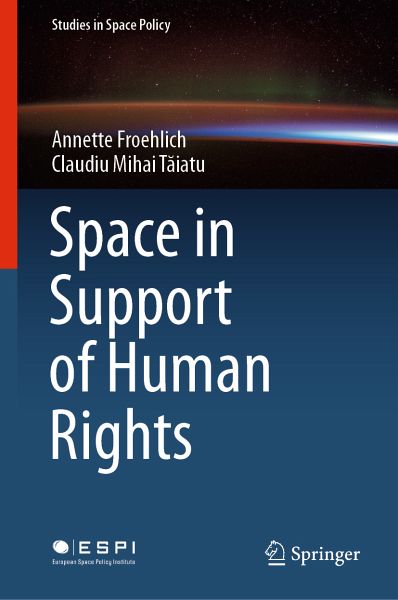
Space in Support of Human Rights (eBook, PDF)
Versandkostenfrei!
Sofort per Download lieferbar
72,95 €
inkl. MwSt.
Weitere Ausgaben:

PAYBACK Punkte
36 °P sammeln!
This book stems from the worrying scale and intensity of conflicts, humanitarian crises, and human rights violations around the world, which can be seen in a wide range of global hotspots including Venezuela, Yemen, Syria, Myanmar, Sudan, Eritrea, and numerous others. These developments are also relevant for Europe, given the large-scale migrations they can produce. In order to effectively respond to them, it has become imperative to analyse ways in which space data and technologies can be used to uphold human rights and monitor violations. Various international tribunals, such as the Internat...
This book stems from the worrying scale and intensity of conflicts, humanitarian crises, and human rights violations around the world, which can be seen in a wide range of global hotspots including Venezuela, Yemen, Syria, Myanmar, Sudan, Eritrea, and numerous others. These developments are also relevant for Europe, given the large-scale migrations they can produce. In order to effectively respond to them, it has become imperative to analyse ways in which space data and technologies can be used to uphold human rights and monitor violations. Various international tribunals, such as the International Court of Justice (ICJ) and the International Criminal Court (ICC), are increasingly relying on satellite data and especially images when considering human rights violations cases. This use of space-related technologies represents a trend that promises to continue as the range and accuracy of space-derived data improves. Further, satellite data has important legal implications because it allows the fulfilment of international obligations to be monitored, and offers a powerful tool for dispute resolution.
Accordingly, this book examines the use of satellite images for cases concerning human rights violations, since the multitude of humanitarian crises worldwide demonstrate that it is of the utmost importance to analyse how space law, policies and space-related applications could further support the implementation and monitoring of the observance of human rights, thus contributing to enhanced security and sustainable development. A range of relevant areas, such as migration, refugees (including settlements and whether they are adequately supplied with basic necessities), water distribution and quality, housing and settlement monitoring are crucial aspects addressed in this book. In closing, the use of satellite data for legal purposes is not without its fair share of problems and concerns, which are also considered to guide the evolution of this emerging field.
Accordingly, this book examines the use of satellite images for cases concerning human rights violations, since the multitude of humanitarian crises worldwide demonstrate that it is of the utmost importance to analyse how space law, policies and space-related applications could further support the implementation and monitoring of the observance of human rights, thus contributing to enhanced security and sustainable development. A range of relevant areas, such as migration, refugees (including settlements and whether they are adequately supplied with basic necessities), water distribution and quality, housing and settlement monitoring are crucial aspects addressed in this book. In closing, the use of satellite data for legal purposes is not without its fair share of problems and concerns, which are also considered to guide the evolution of this emerging field.
Dieser Download kann aus rechtlichen Gründen nur mit Rechnungsadresse in A, B, BG, CY, CZ, D, DK, EW, E, FIN, F, GR, HR, H, IRL, I, LT, L, LR, M, NL, PL, P, R, S, SLO, SK ausgeliefert werden.












